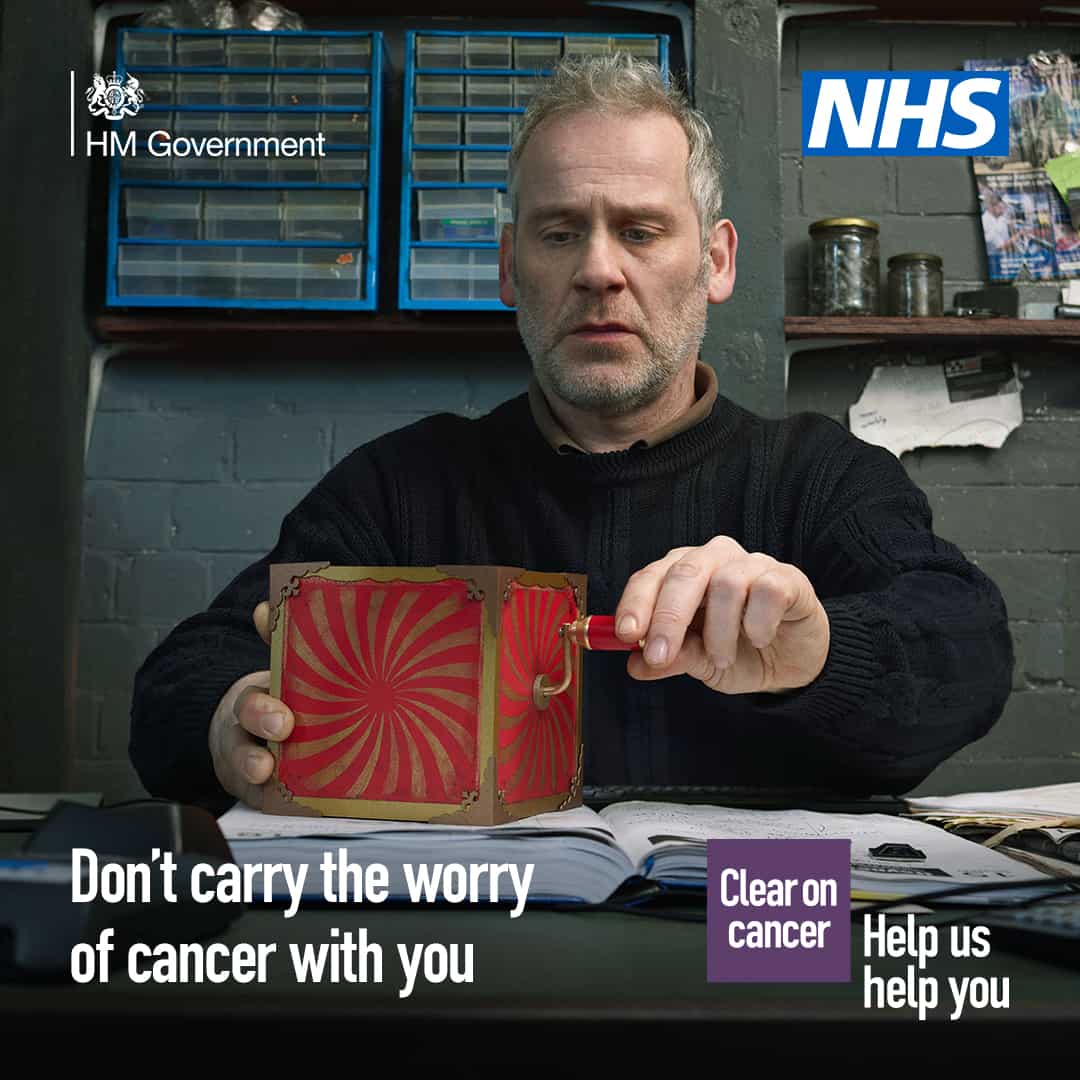
Cancer Alliance is encouraging earlier diagnosis of cancer, as it tours Humber and North Yorkshire urging people aged 50 and over to be more body vigilant.
Awareness of cancer and its symptoms is one of the keys to early diagnosis. Early diagnosis can save lives. Read here about some of the awareness and early diagnosis work taking place in Humber, Coast and Vale.

Cancer Alliance is encouraging earlier diagnosis of cancer, as it tours Humber and North Yorkshire urging people aged 50 and over to be more body vigilant.

From today, Morrisons shoppers in Humber and North Yorkshire will find NHS advice on underwear labels urging them to contact their GP practice if they spot potential symptoms of breast or testicular cancer.
The Nutmeg branded underwear featuring NHS advice will be in 240 Morrisons stores nationwide, including in Bridlington, Hull, York, Scarborough, Cleethorpes and Scunthorpe. The labels will first appear in boxer shorts, followed by crop top bras in the coming months.
The NHS guidance will be displayed on the fabric labels alongside the standard sizing and care information. There will also be a QR code on the packaging and tags linking customers through to more detailed information on breast and testicular cancer on the NHS website.
Morrisons is the first UK supermarket to roll out the new labels and this first of its kind partnership for the NHS is the latest move in a significant drive to ensure people are aware of the signs and symptoms of cancer.
If people notice symptoms that could be cancer, they should contact their GP practice and come forward for checks as early as possible so they can get the all clear or, in some cases, a cancer diagnosis sooner to give them the best chance of surviving the disease.
Symptoms of breast cancer can include a lump or change in the look, shape or feel of one or both breasts, while symptoms of testicular cancer can include painless swelling or a lump in one of the testicles or any change in shape or texture of the testicles.

Customers can scan the QR code on the tags to be linked directly to more detailed information on breast and testicular cancer.
National figures show that 91% of women survive for at least five years if diagnosed at the earliest stage of breast cancer, where the tumour is small (stage one), whereas this reduces to 39% where the cancer has spread to other parts of the body (stage four). While nearly all men survive testicular cancer, if the cancer has spread, survival for five years or more can reduce to 65%.
Dr Dan Cottingham, Cancer Research UK GP Lead for Humber and North Yorkshire Cancer Alliance, said: “This is the first time the whole of the NHS has worked with a national supermarket brand to put health messaging on clothing, with the aim of encouraging thousands more people to be body aware, so they can spot new or unexplained changes that might be cancer symptoms early, and contact their GP practice for checks if concerned.
“Cancer survival is at an all time high survival for both breast and testicular cancers have improved significantly over the last 50 years and we’re seeing more people than ever before diagnosed with cancer at an early stage but we want to continue this progress and this partnership with Morrisons is just one of many ways we are ensuring people are aware of potential cancer symptoms.
“I want to urge everyone to be aware of their own bodies please look out for lumps and bumps or anything else that is unusual for you and get checked out early, it could save your life.”
More people than ever before are being seen and treated by the NHS for cancer in the last year the number of people receiving lifesaving checks for cancer hit nearly three million (2.92m) more than any other year on record. Thanks to extensive NHS campaigns and early diagnosis initiatives, a higher proportion of cancers than ever before were diagnosed at an early stage in the year 2022/2023 – 58% of cancers diagnosed at stage one or two compared to 56% before the pandemic.
The NHS is harnessing the very latest technology and initiatives such as community lung health checks and trials of a blood test that can detect up to 50 cancers before symptoms appear, to diagnose cancer earlier and achieve its goal of diagnosing three quarters of all cancers at stage one or two by 2028.
The NHS is also accelerating the use of innovations like teledermatology for diagnosing skin cancer, which is already seeing some areas double the number of patients seen and speeding up diagnosis and treatment for tens of thousands with skin cancer.
To find your nearest Nutmeg concession please visit, my.morrisons.com/storefinder.
For more information about how NHS England works with partners on national campaigns visit england.nhs.uk/campaign partnerships.

An NHS Targeted Lung Health Check Service, which is helping to save lives through earlier diagnosis of lung cancer and other conditions, is now being offered to eligible participants living in Grimsby.
Over the next few months, people living in Grimsby who are former or current smokers, aged from 55 to 74, and registered with a Grimsby GP practice will receive a letter inviting them to make an appointment for a Lung Health Check telephone assessment with a specially trained nurse.
The telephone assessment covers aspects such as lifestyle, family history and any breathing issues. Following this, some participants may be offered a low dose CT scan which is set to be located at Tesco on Market Street, in Grimsby.
Lung Health Checks are being delivered in phases across North East Lincolnshire and over 600 people living in Immingham have already benefited from the service since it first launched in the area in March 2023.
To find out more about the Lung Health Checks in North East Lincolnshire visit www.lunghealthcheck.org.uk.
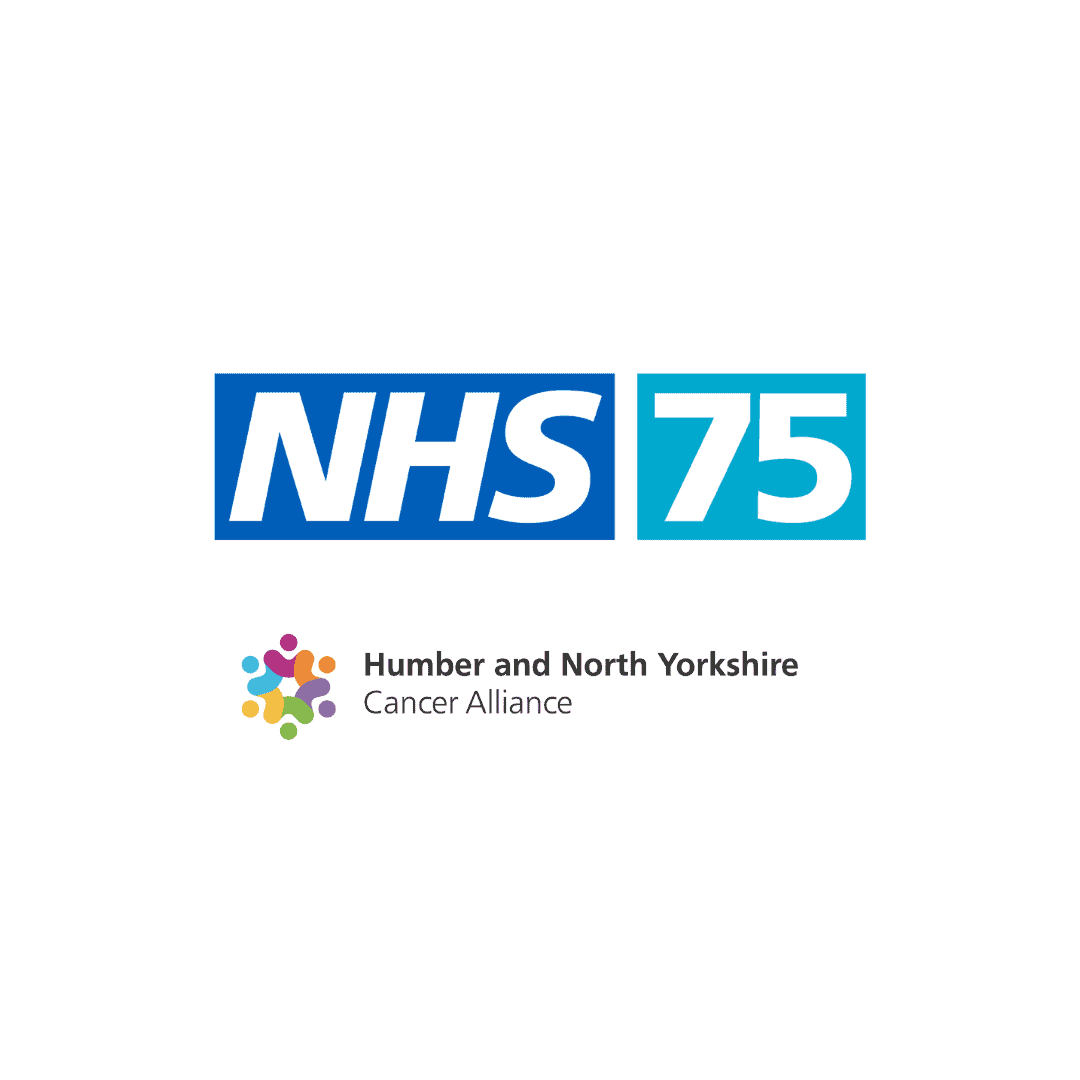
As NHS colleagues prepare to take part in local parkruns across the country to celebrate the NHS turning 75, Humber and North Yorkshire Cancer Alliance staff are marking the milestone birthday by setting an ambitious challenge that will see them complete a distance equivalent to 15,000 parkruns.
Being active can help to lower the risk of some cancers, including breast and bowel cancer, and that is why the Cancer Alliance team is aiming to collectively walk, run, swim or cycle 75,000km during the NHS’s 75th birthday year.
The challenge, which will see staff participate in a series of events throughout the year, is beginning with an event at Health House in Willerby on Tuesday, 4th July 2023. Using a treadmill and an exercise bike, the team will be in a race against time to clock up a total of 75kms in just seven and a half hours.
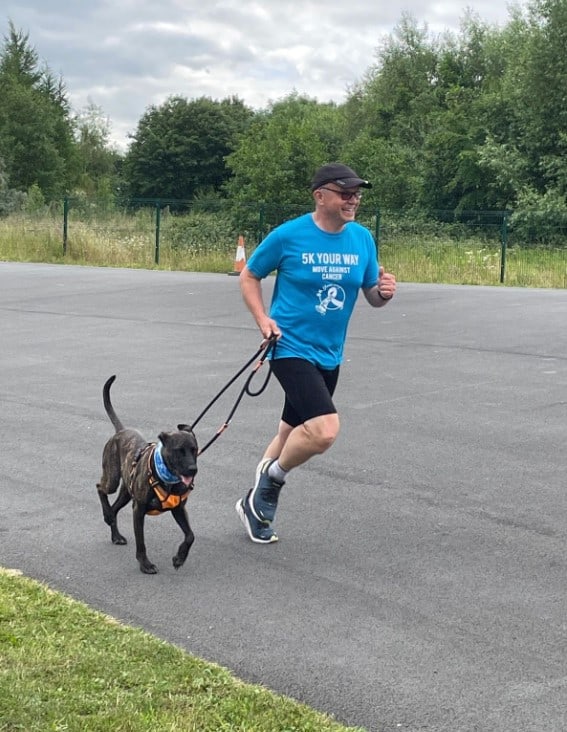
Dr Dan Cottingham
Dr Dan Cottingham, Cancer Research UK GP Lead for Humber and North Yorkshire Cancer Alliance, said: “We wanted to mark this special occasion by taking extra steps to promote the benefits of maintaining an active lifestyle.
“Regular exercise can help someone to lose weight or stay at a healthy weight, which can lower the risks of many types of cancer, and there is evidence to show that doing lots of exercise can prevent breast and bowel cancer directly.
“Physical activity can also have positive benefits for people living with cancer, such as fewer side effects or a quicker recovery, and healthcare professionals may encourage exercise during different stages of cancer or treatment.
“The Cancer Alliance is excited to be embarking on a challenge that will encourage everyone affected by cancer to benefit from activities that not only help to look after our health and wellbeing, but also provide opportunities for socialising and developing new skills.”
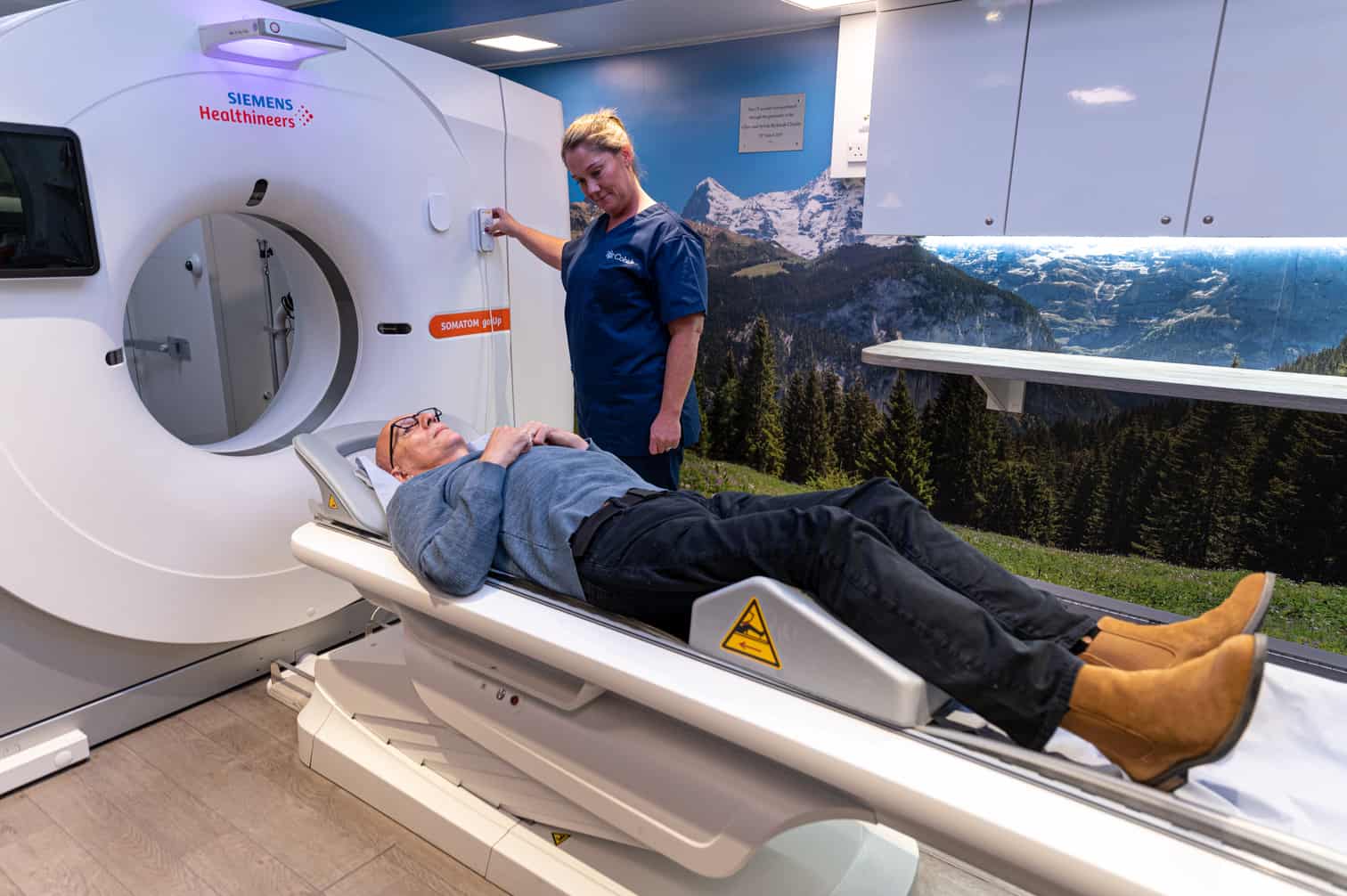
Humber and North Yorkshire Cancer Alliance welcomes the Department of Health and Social Care announcement (Monday, 26th June 2023) that a national targeted lung cancer screening programme will be introduced in the coming years, following the successful delivery of the NHS Targeted Lung Health Check Programme in some parts of the country in recent years.
In Humber and North Yorkshire, the NHS Targeted Lung Health Check Programme has already been established in Hull (early 2020) and North East Lincolnshire (early 2023). There are plans to introduce the service in North Lincolnshire in early 2024 and it is expected that the service will be available in all parts of our region by 2028/29.
Lung cancer prevention is one of the Cancer Alliance’s top priorities – as we have several areas in our region where smoking prevalence is well above the national average. Early detection of lung cancer is key – because often lung cancer is symptomless until it is at an advanced stage.
Click here to view the Department for Health and Social Care’s announcement.
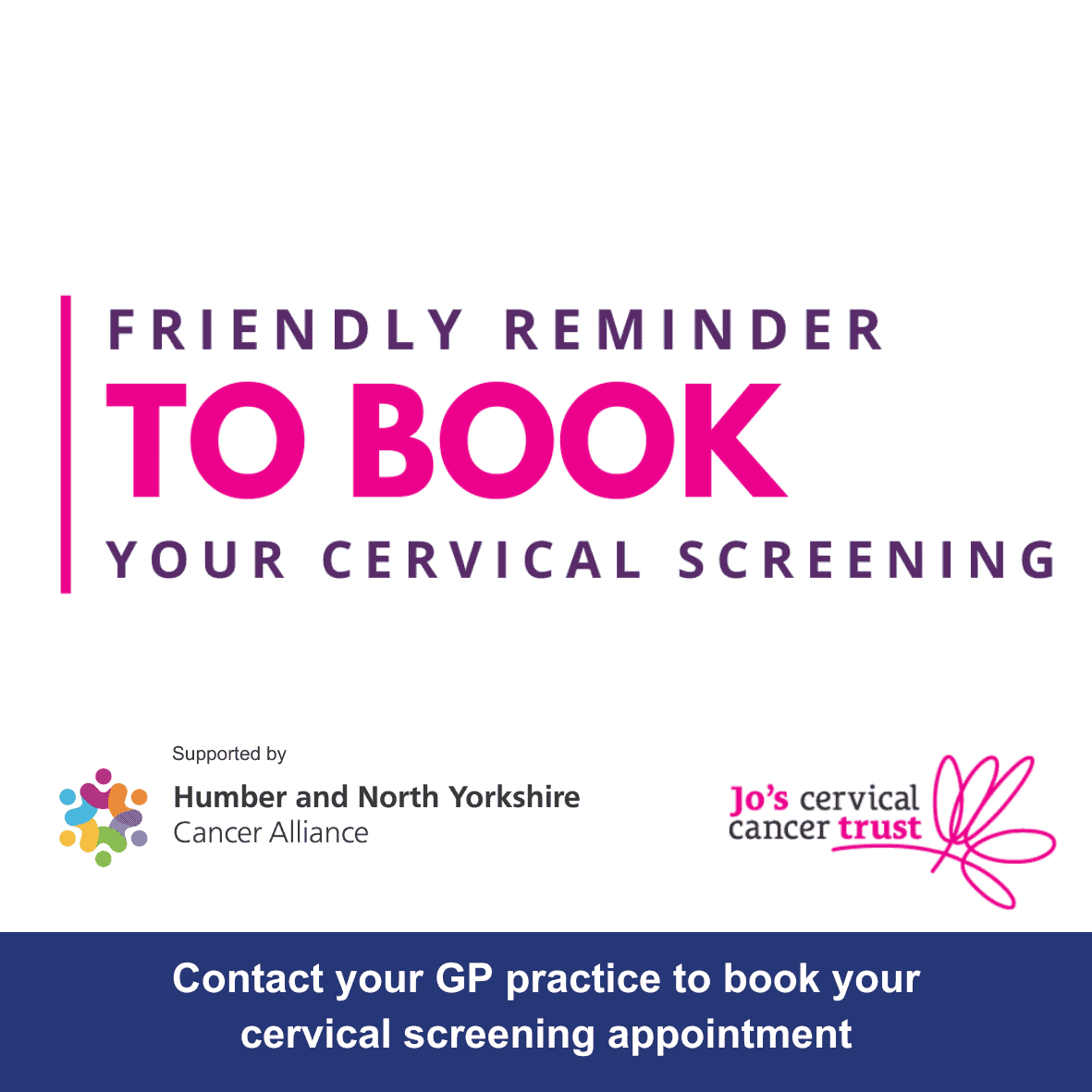
If you ask someone what they talk to their hairdresser or beautician about, you might expect answers such as social events, holiday plans, and family updates. However, several salons in the Humber and North Yorkshire region will be adding cervical screening to their topics of conversation from this week.
Monday, 19th June 2023 marks the start of Cervical Screening Awareness Week and Humber and North Yorkshire Cancer Alliance is working with hairdressers and beauticians from areas with the some of the lowest rates of uptake, to help encourage more women and people with a cervix (aged from 25 to 64) to book their cervical screening appointment.
With almost one in three people not booking their cervical screening appointment, Humber and North Yorkshire Cancer Alliance has equipped local hairdressers and beauticians with the information needed to talk about the benefits of cervical screening, and breakdown any barriers that may prevent someone from booking an appointment.
Cervical screening helps to prevent cervical cancer by checking for a virus called high-risk HPV which causes nearly all cervical cancers. This means any cervical cell abnormalities can be treated. If left untreated, these cells can develop into cancer.

“I am so glad I went for my initial cervical screening.” – Meg Long, Hull
Meg Long, a mum of twins from Hull, attended her first cervical screening appointment at the age of 25 and said “Life is busy, and I could have easily let my cervical screening fall to the bottom of my to do list, especially as I was not looking forward to having it done, but I am so glad I went.
“After my appointment, I was invited back for a second screening which showed abnormal cells and HPV, so I was referred for a colposcopy and waited anxiously for the test.
“The whole thing was over much quicker than I thought it would be and all of the staff were lovely. A few weeks later, I was pleased to find out my results no longer showed HPV or abnormal cells.
“I am so glad I went for my initial cervical screening. It was not as unpleasant as I thought, and all of the NHS staff made me feel as comfortable as possible. Plus, getting the peace of mind when you get your results is worth it!”
Dr Dan Cottingham, Cancer Research UK GP Lead for Humber and North Yorkshire Cancer Alliance, said: “If you have been invited for a cervical screening and have not booked an appointment yet, please contact your GP practice without delay. If you have any questions or are worried that you may find the test uncomfortable, talk to the person doing the test so they give you the right support.
“We are excited to be working with local hairdressers and beauticians who can talk to lots of people about cervical screening. The more local Cancer Champions we have helping us raise awareness of NHS cancer screening programmes, the more likely we are to encourage uptake and improve outcomes for people in Humber and North Yorkshire”
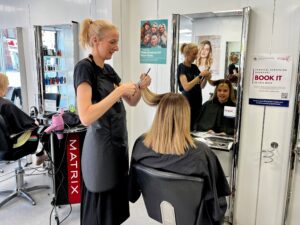
The FeMale Ego Hair and Beauty team are encouraging important discussions about cervical screening
Donna Finn, owner of FeMale Ego Hair and Beauty salon in Hull, said: “My own experience of cancer meant I jumped at the chance to learn more about cervical screening. I want to support my clients to not only look good on the outside, but also be aware of how they can help look after themselves on the inside.
“I feel confident to talk about cervical screening and know I can signpost my clients to Jo’s Cervical Cancer Trust or the NHS website if they need more information they can trust.”
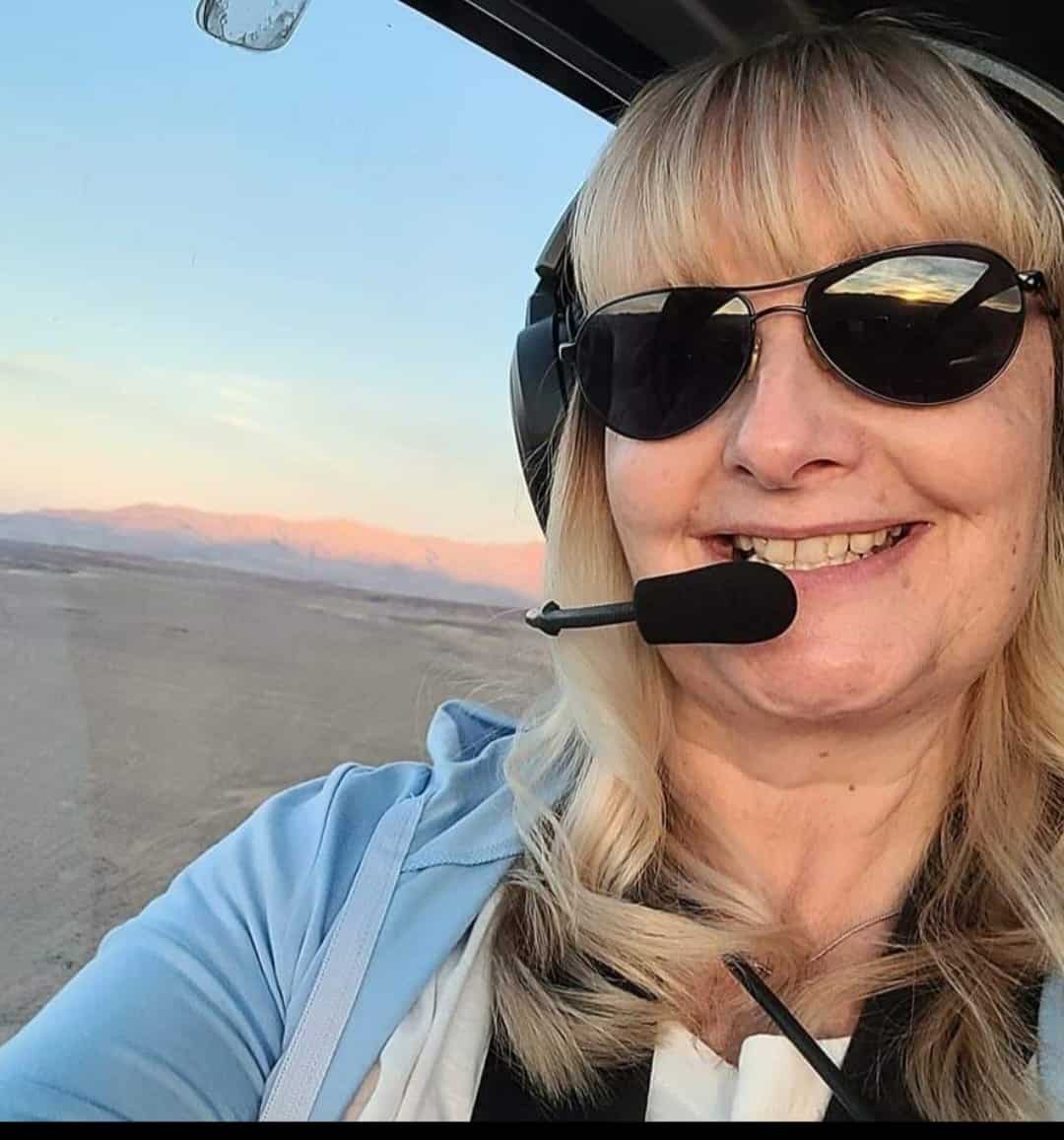
Tracy, 50, from Beverley, East Yorkshire, was a regular sunbed user and never really took sun safety seriously until she developed skin cancer six years ago. Tracy is now sharing her story to help raise awareness of the importance of protecting your skin from UV rays.
Tracy said: “Looking back, I never thought of the risks involved of sitting in the sun or using a sunbed. I always thought of a tan as looking healthy but now I know, there’s no such thing as a healthy tan, a tan in fact shows that there’s been damage to your skin cells from UV rays, so it is far from healthy.”
Tracy had always been aware of a mole on her arm and had previously asked her GP to look at it. At the time the GP had no concerns. Towards the end of 2016, Tracy noticed that the mole had grown and had lost its colour in the middle. It had irregular borders, was around 1cm wide and was dry.
Tracy said: “I told a colleague at work, who insisted that I got it checked, so I made an appointment with my GP at the start of February 2017. The GP used a Dermatoscope to take a closer look at the mole. She said she would refer me for further investigations, ‘just in case’, little did I know how serious things were to become.”
Tracy saw a consultant approximately two weeks later and was told that her mole needed removing immediately. She was scheduled for surgery on 26th February 2017.
Tracy said: “The next few weeks went by and as time went on, I thought everything must be okay. However, on 9th May 2017 I was delivered the devastating news from a Skin Cancer Nurse Specialist, that I had malignant melanoma skin cancer. I was petrified as my friend’s brother had died following a skin cancer diagnosis.
“However, the nurse was excellent, she gave me lots of information and was available for any questions I had. I was also offered counselling at the Queens Centre at Castle Hill Hospital in Cottingham.”
Tracy needed to have the surrounding margins from where the mole had been, removed. She recalled: “I was due to fly to Florida that week, I considered cancelling, but had a very excited nine-year-old at home and my consultant told me to go and enjoy the holiday.”
Tracy was booked in for surgery the day after she returned from America. The wide local incision meant she had to have the biopsy scar and surrounding tissue removed. Tracy explained: “The surgery was done under a local anaesthetic, and I had a six-inch scar on the top of my arm, but it was worth it to know that the cancer was potentially gone.”
Five weeks later, Tracy received a call to say that everything was clear. She continued to be seen for another year for observations. During this time a biopsy was taken on another mole, which was benign.
In 2019 Tracy was discharged from NHS care, but now sees a dermatologist privately, and has had six more moles removed.
Tracy said: “I now wear factor 50 sunscreen all year, and although I do still holiday abroad, I stay out of the sun in the shade, and cover up. To be honest I prefer sitting in the cool with a cocktail!
“If I could give advice to anyone, it would be that there is no such thing as a healthy tan. Protect yourself with clothing and a high SPF, do not sunbathe and never use sunbeds. It really is not worth it.”
Find out more about skin cancer, sun safety and the steps you can take to protect yourself on the Skcin cancer charity website.

Tracy now enjoys the sun safely
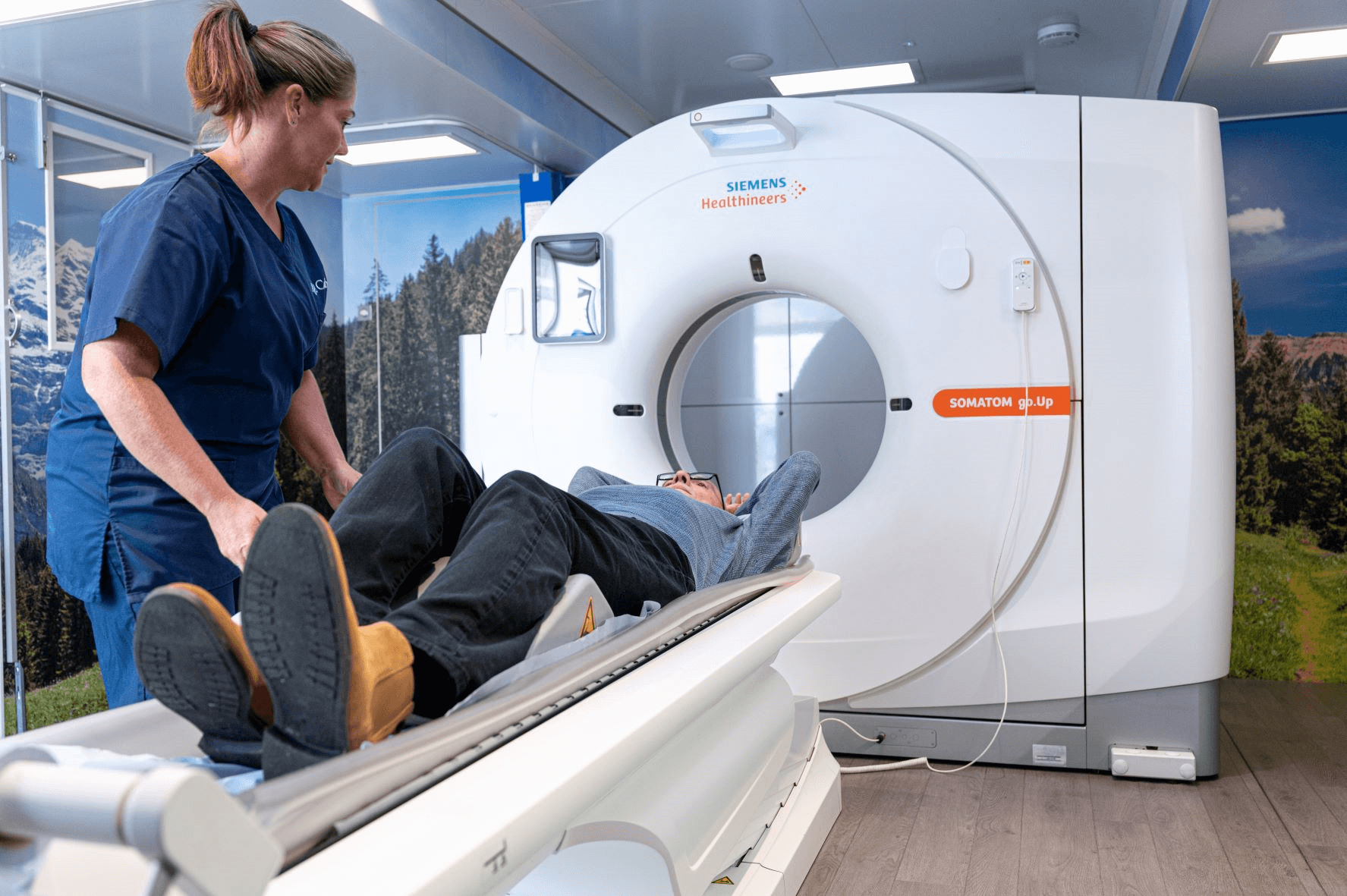
People in deprived areas are now more likely to be diagnosed with lung cancer at an earlier stage, thanks to the success of NHS lung trucks.
For the first time ever, new data shows more than a third of people diagnosed with lung cancer from the most deprived fifth of England were diagnosed at stage one or two in 2022 (34.5%) – up from 30% in 2019.
Lung MOTs, located in mobile trucks in supermarket carparks, launched in 2018 in areas of the country with the lowest lung cancer survival rates – and they have already made an impact on earlier diagnoses.
As part of the biggest programme to improve earlier cancer detection in health history, the NHS has now teamed up with the Roy Castle Lung Foundation on a new campaign encouraging the hundreds of thousands of people who are invited each month to take up the potentially lifesaving scan.
The campaign will be running over the coming months across social media, through online advertising and on posters in areas where lung checks are operating.
More than 300,000 (313,387) people have already taken up the offer and the trucks have diagnosed more than 1,750 (1,779) people with lung cancer. Over three-quarters (76%) were caught at stage one or two, compared with just a third caught at early stages in 2018.
People diagnosed with lung cancer at the earliest stage are nearly 20 times more likely to survive for five years than those whose cancer is caught late.
Now at 43 sites across the country, the mobile trucks scan those most at risk from lung cancer, including current and ex-smokers, inviting them for an on-the-spot chest scan for those at the highest risk. Advice to help people stop smoking is also provided to those who attend.
Cancer survival is at an all-time high in England and the latest data shows the NHS is diagnosing more patients with cancer at an earlier stage than ever before, when it is easier to treat – over 100,000 (104,012) patients were diagnosed with cancer at stages one or two when it is easier to treat – the highest proportion on record.
National Director for Cancer, Dame Cally Palmer, said: “These findings are incredibly important – they show the power behind targeted health programmes with the NHS continuing its drive to detect cancers earlier by going into the heart of communities that may be less likely to come forward.
“While early diagnosis rates for cancer have traditionally been lower for deprived groups, thanks to the rollout of lung trucks, the NHS has turned a huge corner – and is now finding and treating those who would otherwise have been undetected.
“The NHS will not stop in its efforts to go out and find more cancers at an earlier point, when easier to treat, so if you have had an invite, please take it up, and as ever, if you are showing any signs of cancer, please come forward to your GP – getting checked could save your life”.
Health Minister Helen Whately said: “Catching lung cancer early saves lives, which is why we’re prioritising early diagnosis for those most at risk.
“These figures show how care closer to home for 300,000 people, using NHS lung trucks, has potentially saved over 1,750 lives.
“We’re laser-focused on fighting cancer on all fronts – prevention, diagnosis, and treatment, backed up with funding and research – and alongside these mobile trucks we have also opened 100 community diagnostic centres, which have delivered over 3.6 million additional tests, checks and scans, including lung checks”.
Chief Executive of Roy Castle Lung Cancer Foundation, Paula Chadwick, said: “It is truly heartening to see the wonderful progress being made in the early detection of lung cancer because of the targeted lung health check programme and these checks are allowing us to get ahead of lung cancer for the first time, catching the disease at the earliest opportunity, often before symptoms even start, and treating it with an aim to cure.
“So many people have already benefitted from having a lung health check but there are also a lot of people who have been invited and not taken up the opportunity, so I urge anyone who receives an invitation to have the check – even if you feel well, even if you have no symptoms, even if you’re convinced there’s nothing wrong! You have been invited for a reason and when it comes to lung cancer, it is always best to check”.
Smoking causes more than seven in ten lung cancer cases in the UK. Previous trials have shown that CT screening reduced lung cancer mortality by 26% in men and between 39% and 61% in women.
Not only do the lung trucks scan for cancer, but they have also identified thousands of people with other undiagnosed conditions including respiratory and cardiovascular disease, enabling them to access the treatment they need earlier, and helping to prevent potential hospitalisations.
Thanks to awareness campaigns and early diagnosis drives, the NHS has been seeing and treating record numbers of people for cancer, with over 2.8 million getting checked for cancer in 2022, and over 320,000 people received treatment for cancer in the same year – up on 2.35 million checks and 8,000 treatments in the same period before the pandemic.
The NHS has also made considerable strides in bringing down the 62-day wait cancer backlog with 4,868 fewer people (19,027) waiting in March 19 compared to the same period the month before (23,874).
The main symptoms of lung cancer include:
The Lung Health Checks are now available in North East Lincolnshire. For more information on the Targeted Lung Health Check programme in the Humber and North Yorkshire region please visit www.lunghealthchecks.org.uk.
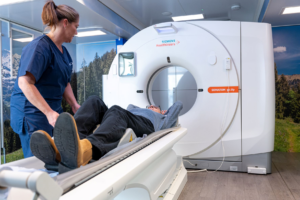
A patient about to have their lungs checked
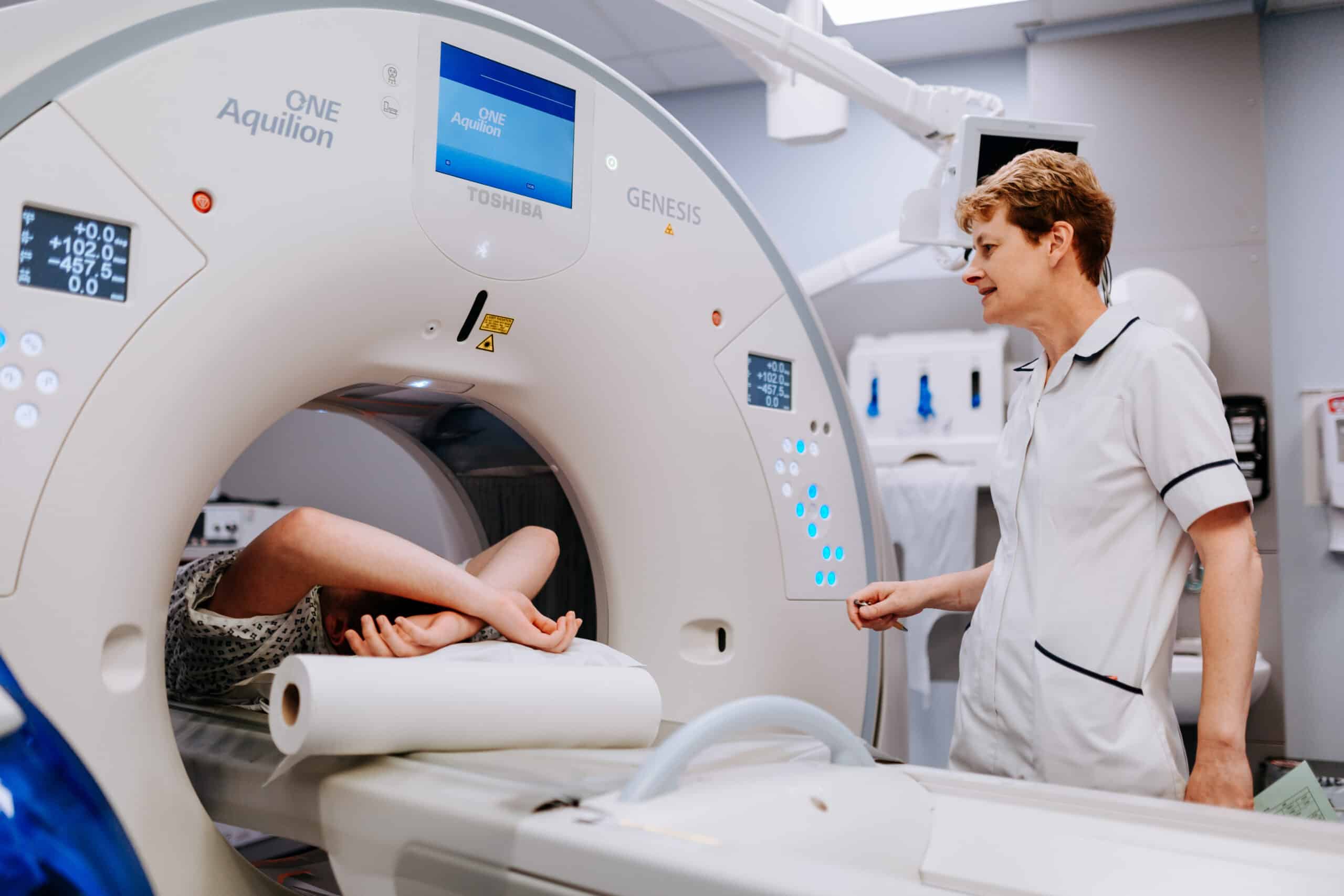
More than 19,000 people in North East Lincolnshire are being invited for a free NHS Targeted Lung Health Check, which can identify potential lung problems earlier when they are easier to treat.
The checks are open to past and present smokers aged between 55 and 74, who are registered with a local GP, and support the NHS ambition to detect more cancers at an earlier stage.
Eligible people are being contacted in phases and will receive a letter from their GP inviting them to book an appointment. Those first receiving invites are patients from The Roxton Practice Immingham, followed by Open Door and Quayside Medical Centre.
Dr Stuart Baugh, Clinical Director for the NHS Targeted Lung Health Check Programme in North East Lincolnshire said: “Lung cancer especially, is often diagnosed at a later stage as there are rarely symptoms early in the illness. The NHS Targeted Lung Health Check programme checks those most at risk of developing lung cancer to spot signs of lung and chest problems earlier when treatment can be simpler and more effective.”
Dr Iain Chalmers, Cancer Care Lead for North and North East Lincolnshire and Medical Director at St Andrews Hospice Grimsby added: “Lung Health Checks are going to make a huge difference to so many people. I urge anyone, who receives a letter, to make an appointment. If any problems with your lungs are found early, it could ultimately save your life.”
Anyone invited for a Lung Health Check has an initial 20-minute phone assessment with a specially trained health care professional. This looks at breathing, lifestyle, family, and medical history. If the assessment finds the person to be at high risk, they are offered a low dose CT scan which can detect early signs of lung cancer or lung disease.
CT scans take place in a mobile unit in community locations such as supermarket car parks and sports stadiums, making it easy for people to park and drop in. As the Lung Health Checks will operate in phases, the unit will move around to be convenient and accessible to people in those areas. Details of the locations can be found at www.lunghealthcheck.org.uk as they’re released.
Lung Health Checks are offered at various times during the week, making it as easy and convenient as possible for people to take up the opportunity. The mobile units being in central locations such as shopping centres mean people needing a CT scan can even combine this with their weekly shop, removing the need for any unnecessary journeys too.
During the check, current smokers will also be offered advice to support them to stop smoking should they wish to, and the Lung Health Check team will also be available to answer any questions people might have.
Scan results are analysed by specialist clinicians and participants receive their results in approximately four weeks. If further follow up is needed, participants are referred by the service to their GP or hospital.
Stuart added: “Finding cancers early is essential. From what we’ve seen during the initial pilot phases, such as that in nearby Hull, Lung Health Checks are undoubtedly playing a big part in improving cancer outcomes across the UK.”
For more information on the Targeted Lung Health Check programme please visit www.lunghealthchecks.org.uk.

A new initiative to check for liver cancer in high-risk communities has been rolled out as part of a major NHS drive to catch more cancers earlier and save lives.
The roaming trucks performed more than 7,000 fibroscans and identified over 830 people with cirrhosis or advanced fibrosis, a leading cause of liver cancer, in eight months (June 2022 to January 2023) – with the majority of those identified referred on to further care.
The mobile trucks are visiting high-risk communities across the country at GP practices, recovery services, food banks, diabetes clinics, sexual health clinics and homeless shelters to perform quick, non-invasive scans.
The trucks are expected to visit and scan 22,000 people during the first year of the pilot scheme.
Checks are being offered in the community to adults with high levels of alcohol consumption, a current diagnosis or history of past viral hepatitis, or non-alcoholic liver disease, as these factors increase the risk of developing liver cancer.
NHS staff are already visiting at-risk communities as part of the Hepatitis C Elimination Programme and the programme is being expanded to include a liver health check involving an on-the-spot fibrosis scan which detects liver damage.
Around 6,100 people are diagnosed with liver cancer each year but the number of cases has doubled over the past decade and is expected to continue to rise.
Currently only one in three liver cancers are diagnosed at an early stage, but this programme will help catch more cancers earlier, giving patients a much better chance of surviving the illness. If caught early, patients have a 70-90% chance of survival for five years or more with treatment.
Thanks to the efforts of NHS staff, major public awareness campaigns and targeted screening interventions, more people than ever before are being checked and treated for cancer – with over 2.8 million people checked for cancer and 322,000 starting treatment for cancer in the last year (February 2022 – January 2023).
The NHS has also made significant progress on the 62 day cancer backlog – reducing it by around 10,000 from an all-time high of 33,950 last summer to 22,282 for week ending 26 February 2023, despite record levels of demand on cancer services.
Dame Cally Palmer, National Cancer Director for the NHS in England, said: “Building on the success of other community diagnostic schemes, like our lung trucks, this innovative surveillance programme is bringing lifesaving checks to people who are at a higher risk of liver cancer, and who may have found it difficult to come forward or access health care otherwise.
“The on-the-spot liver scans have already found that around one in ten people in communities visited have advanced liver damage that needs further monitoring or treatment as it could lead to liver cancer – ensuring these people are seen early and referred on for further testing will help us to diagnose cancers at an earlier stage.
“We’ve already seen hundreds of people diagnosed at an earlier stage through our targeted lung cancer trucks, and now with the addition of NHS teams offering these vital liver checks in mobile trucks across the country, I urge anyone who is offered a scan in their community to take up the opportunity.”
Those who are deemed high risk will be provided with information about their level of risk and where appropriate will be referred to their GP. If needed, patients will be referred straight into a six-month liver surveillance care programme, where they will be partnered with a peer support worker who will continue to check in, as well as offer guidance and help informed by people who have experienced liver disease themselves.
The pilot scheme delivers on the NHS Long Term Plan ambition to detect cancer as early as possible so that three in four people have their cancer detected at a very early stage when treatment is more effective. The screening programme means that patients get access to the specialist services they need quickly – regardless of where they live.
Professor Peter Johnson, NHS clinical director for cancer said: “Liver cancer can be hard to detect at an early stage and so these checks, for people who have been identified as higher risk, are an essential part of the NHS’s action to find more people with cancer – and in groups that may otherwise find it hard to access lifesaving tests.
“There are diseases that we know increase the risk of liver cancer, which is why the liver trucks will be visiting particular treatment clinics.
“Lives are saved when cancers are caught early and when more people are referred for tests, which is why the NHS has put so much effort into early diagnosis in recent years, as well as increasing to access to testing.”
Health Minister Helen Whately said: “We know the earlier we detect cancer, the earlier treatment can begin and the better the chance of a patient recovering.
“We are supporting the NHS to bring liver scans into the heart of communities to help tens of thousands of patients to receive a potentially life-saving diagnosis sooner”.
Symptoms of liver cancer include unexpected weight loss, loss of appetite, vomiting blood, and pain or swelling of the abdomen. If anyone has symptoms of liver cancer, they should contact their GP straight away.
The programme will identify those at risk of the most common form of liver cancer, hepatocellular carcinoma (HCC), which makes up 85% of all liver cancers.
Health chiefs have doubled spending on cancer awareness campaigns and continue to encourage people to come forward for checks if invited by the NHS or if they have experienced any worrying symptoms.
Nathan Motherwell, a peer support worker who works for the Hepatitis C Trust in support of the Hepatitis C Elimination programme is visiting communities in Kent to carry out liver checks.
Nathan, who began working for substance misuse programmes in 2007, said he likely had hepatitis C for around 12 years before being diagnosed.
Speaking about the success of the Hep C Elimination Programme, Nathan said: “Thanks to our targeted approach to supporting these at risk communities, we have developed a strong rapport with them which has encouraged more people who otherwise would be reluctant, to come forward for potentially life-saving scans on the community vans.
“Our refer-a-friend scheme has also increased the number of people coming forward for scans and helped identify more people with hepatitis C so that they can get the treatment they need sooner – this shows how impactful a relatable face can be and we hope to replicate this success with the liver check expansion.”
In his peer role, Nathan stays in contact with people who approach the programme, often visiting them to remind them to take medicines and keeping stock of what they have taken.
The work of the Hep C Elimination Programme is also widely known among the wider network of support schemes in Kent, which enables them to refer people to the relevant teams for further help if needed.